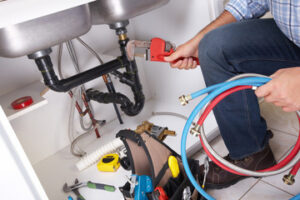Licensed plumbers must install backflow prevention devices. Plumbers will ensure that the correct size of backflow prevention device is installed in your plumbing and that it properly seals so there is no risk of allowing raw sewage to back up into your main freshwater supply. You don’t want to risk your family’s safety by trying to install it yourself or by hiring an amateur non-professional. The devices themselves are fairly simple and don’t require too much skill.
 A closed loop system is one type of backflow prevention device that can prevent backflow. In a closed-loop system, waste is flushed through one hole, then out the other. A gravity feed lets liquids flow backwards through a drain line. Because solids and waste move in one direction only, this type of backflow device doesn’t create a siphon flow, which means that there is generally no risk of sewage contamination of main water supply.
A closed loop system is one type of backflow prevention device that can prevent backflow. In a closed-loop system, waste is flushed through one hole, then out the other. A gravity feed lets liquids flow backwards through a drain line. Because solids and waste move in one direction only, this type of backflow device doesn’t create a siphon flow, which means that there is generally no risk of sewage contamination of main water supply.
Many different types of backflow devices can be installed in your home. Your plumber can guide you to one that will best meet your needs. However, if you have questions about the type of device that will work best for your home, most plumbers will offer free estimates. Be sure to get several quotes before making your final decision about backflow devices. Nothing is worse than having a new water device on the job and then discovering that you need another one because your original one is backed up.
The best devices to prevent as much as possible from entering your home. Backflow preventers can be single-stage devices, which mean that they stop only once they detect the presence of any contaminants. Or, double-staged backflow preventers can be installed to detect contaminants before they enter the home or immediately trigger the alarm. This is why they are usually used in schools, offices, and businesses, as well as in institutions of higher learning.
A backflow prevention device is essential for safety and reliability if your home has both hot and cold water pressure. But there are certain instances when installing a device would actually be harmful to your home. For instance, backflow devices that are installed near a main water line are very risky. These devices often carry dangerous amounts of chemicals with them that could prove deadly if leaked. If a leak occurs, there is a good chance that contaminated waste will enter your home. In addition to this, installing a backflow prevention device in an area where there is very strong water pressure could cause damage to your pipes or main water line.
Another instance when it would be better to hire licensed plumbers is if you are having problems with the toilet, bathtub, drain, septic tank, etc. Sometimes, these are installed incorrectly and a small mistake could lead to flooding or even electrocution. Therefore, before you make any major plumbing installation changes, you should first consult a plumbing professional who will determine if it’s really necessary to call in the professionals.
A backflow prevention device is a great way to prevent leaks and other problems. But when you hire certified plumbers, you can be sure that these devices are installed correctly and will provide you with excellent service. Some common mistakes in plumbing installations include installing backflow prevention devices without enough water pressure, backflow devices that do not fit properly, and improperly placed backflow devices. Also, a plumber who charges the same rate per hour as the company he works for might not be the best person to hire to install your backflow prevention device. Hiring licensed plumbers allows you to receive professional services at a fair price.
Certified plumbers have the knowledge and experience required to properly install the backflow prevention devices needed to protect your home. When hiring a plumber, be sure to ask questions, and take advantage of all the guarantees offered by the plumbing company. Most reputable companies offer a warranty on the products they sell, including their backflow prevention devices. If they don’t offer a warranty, find out why you won’t be able to get repair assistance or exchange damaged backflow prevention devices. Find out if the company offers emergency services, such as phone consultations, in the event of a plumbing emergency. Finally, hire a licensed plumber with a good reputation to ensure that your home is in good hands.

